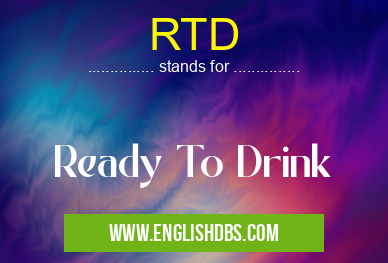What does RTD mean in FOOD & NUTRITION
RTD stands for Ready To Drink, a term often used in the food and beverage industry. It refers to any type of beverage that can be consumed without any additional preparation. This includes alcoholic beverages, such as beer, wines, spirits, and cocktails; non-alcoholic beverages like sodas and juices; and even hot drinks such as coffee or tea. RTD products are pre-mixed beverages that are packaged in cans, bottles, or pouches ready for immediate consumption.

RTD meaning in Food & Nutrition in Miscellaneous
RTD mostly used in an acronym Food & Nutrition in Category Miscellaneous that means Ready To Drink
Shorthand: RTD,
Full Form: Ready To Drink
For more information of "Ready To Drink", see the section below.
Meaning of RTD
RTD is a convenient way to enjoy a range of drinks without having to mix them yourself or wait for them to be made at a bar. Ready To Drink (RTD) products are often cheaper than their bottled counterparts because they don't require additional ingredients or equipment and can be produced quickly. As its name suggests, no extra effort is required to enjoy an RTD product - simply open it up and enjoy!
Advantages of RTD
The main advantage of ready-to-drink products is convenience. You don't need to go out or hunt down a specific drink - you just reach into your cupboard (or fridge!) for an easily accessible drink. Convenience also extends beyond the ingredient sourcing - no special tools or mixing techniques are needed; various components such as fruits, spices, herbs etc are all conveniently pre-mixed with the alcohol base by the manufacturer. In addition to convenience, RTDs tend to be more economical than buying ingredients separately due to economies of scale associated with bulk production of beverages by large manufacturers.
Disadvantage of RTD
Although ready-to-drink products have some advantages over conventional mixed drinks, there are also some drawbacks that need to be considered before choosing one over another. For example, these products may contain added sugars and other artificial flavors which can detract from the quality of the drink overall compared with homemade versions using fresh ingredients. Furthermore, drinkers may not have control over their alcohol levels when working with ready-to-drink products since these will typically come pre-packaged at one ABV (alcohol by volume).
Essential Questions and Answers on Ready To Drink in "MISCELLANEOUS»FOOD"
What is Ready to Drink?
Ready to drink (RTD) refers to pre-made, shelf-stable beverages that are ready to consume without any preparation. These can include juices, teas, energy drinks, sodas, and more.
How is an RTD different than a canned drink?
Whereas canned drinks typically require dilution with water or ice before being consumed, an RTD does not need to be diluted in order for it to be enjoyed. For this reason, many people choose RTDs due to their convenience and portability.
Is an RTD healthy?
This depends largely on the individual type of RTD you are consuming as there can be a range of healthy and less healthy options within this category. Generally speaking, however, there are some healthier alternatives available compared to regular sodas and juices found in cans or bottles.
Are all RTDs suitable for children?
No – it’s important to check the labels on any type of beverage product before serving it to children or making it available for them to consume. Some may contain high levels of sugar or other ingredients which may not be appropriate for young children.
Where can I find RTDs?
Most local supermarkets will stock a variety of RTDs from well known brands as well as regional producers - you may also find some at smaller convenience stores or gas stations too!
What types of flavors do RTDs come in?
This varies depending on the type and brand of beverage but typically you’ll find a wide array including classic favorites (e.g., cola and root beer) as well as more unique flavor combinations (e.g., blue raspberry & limeade).
Do all RTDs contain caffeine?
No – many are caffeine free so you can enjoy them any time of day without worrying about stimulants affecting your energy levels later on!
Are there non-alcoholic options available within the RTD category?
Absolutely - while some beverages such as cocktails are traditionally ready-to-drink alcoholic options, others such as teas, tonics and sodas are non-alcoholic.
Does every brand make all types of ready-to-drinks?
Not necessarily – most brands will usually focus on one type of product rather than branching out into producing multiple types of drinks e.g., a coffee company may only make espresso based products whereas a juice producer will specialize in fruit juices and smoothies.
Final Words:
In conclusion, Ready To Drink (RTD) beverages offer consumers convenience and cost savings while eliminating much of the time and effort associated with creating a traditional alcoholic beverage from scratch using individual ingredients. While there may be some tradeoffs in terms of quality and choice when it comes to flavored spirits in particular, consumers should weigh these benefits against potential disadvantages before making their purchasing decision.
RTD also stands for: |
|
| All stands for RTD |
